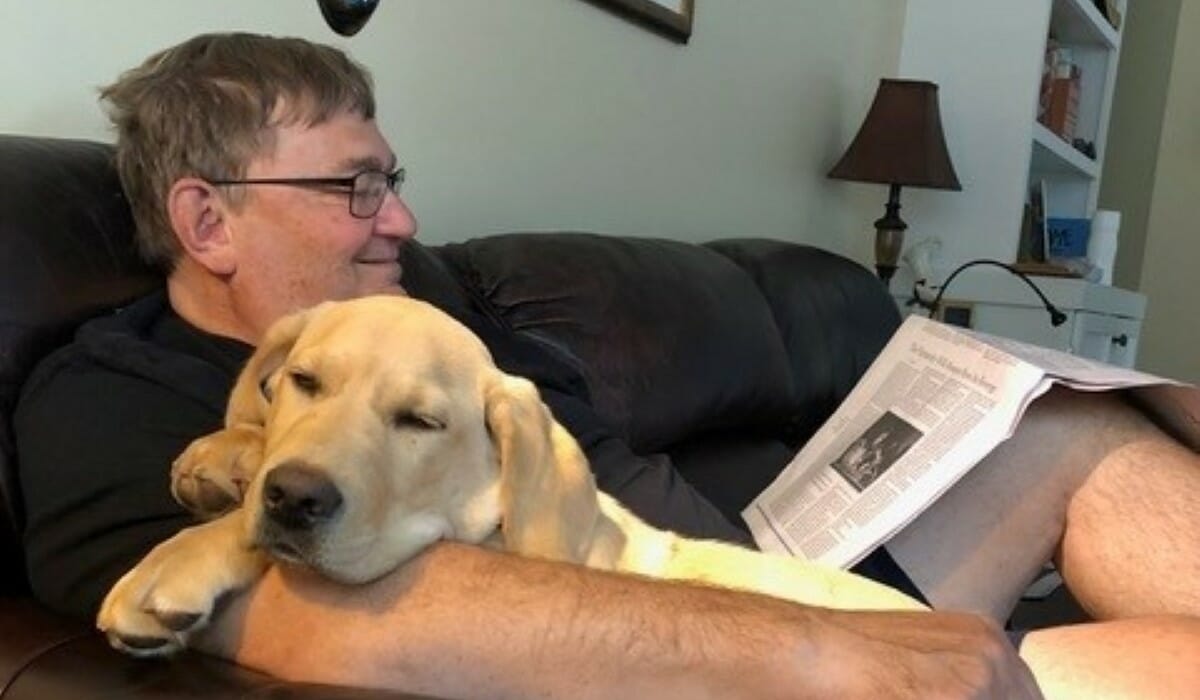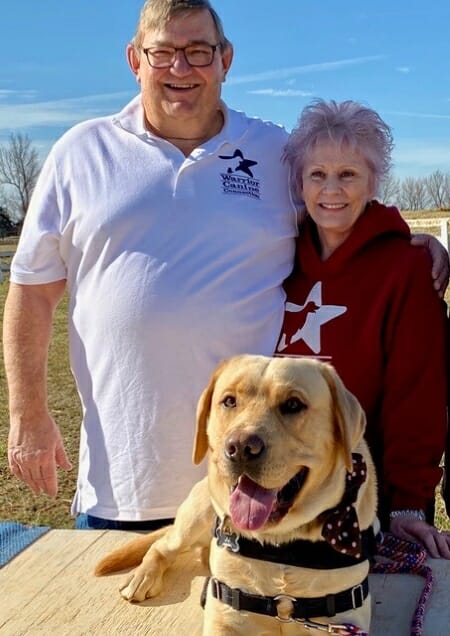Retired Restaurant Manager Serves Veterans

Meet Daily Point of Light Award honoree Paul Kolze. Read his story and nominate an outstanding volunteer or family as a Daily Point of Light.
Paul Kolze, 54-year-old retired restaurant manager, has spent 40 years feeding others. Sometimes operating as many as 30 locations at a time, he knows the ins and outs of restaurants and bars in airports across the country.
Now, he’s moved from office work to kitchen work as he turns his lifelong passion for cooking into a valuable service for fellow volunteers and supporters of Warrior Canine Connection (WCC). WCC trains service dogs and connects them with veterans with issues stemming from trauma experienced during their service. Paul serves up delicious food for events, and along with his wife, has raised six dogs to serve men and women who need assistance after returning home from conflicts.
What inspires you to volunteer?
In the restaurant industry. I never had much time to give back to the community. My wife was a schoolteacher, and she retired and found this organization. She started talking to a lady with a dog at Target one day and got involved in WCC. And so, of course, it became a partnership with both of us. We got a dog. Cooking came later. I’ll use any reason as an excuse to cook.
Describe your volunteer role with Warrior Canine Connection (WCC).
A friend and I smoked a 60lb pig and fed 60 volunteers with three sides this weekend. I do all kinds of cooking for them. For all the staff, I make birthday desserts for each of their birthdays. And when they need catering, I do that, too.
I’m also a puppy parent. My wife and I raise and train dogs for veterans with mobility issues and PTSD. We go in every week for training, then reinforce it at home. Our first two dogs were released from the program. One couldn’t be trained. The other was rejected for guarding her food when other dogs got close during mealtimes.
Our third dog, JJ, was very successful. He’s now working with a veteran at the Pentagon who lost both of his legs in war. So he goes to the Pentagon every day, helping him through life. My wife’s is now a service dog for a veteran in Baltimore. I’ve spent the last two years training one of JJ’s sons, Ruck, who was recently placed with a veteran in Ohio who has PTSD. He’s doing very well. Every one of them is like a child with a different personality.
How is raising a service dog different than a regular pet?
Only about one-third of them make it through the program. They’re looking for good behavior. They don’t jump on you or bark. They only go to the bathroom where they’re supposed to go. By the time they finish, they may know 80 commands. These dogs can open doors, retrieve a bottle of water from the fridge, pick up a phone or a set of keys. They can turn on and off the lights. Some are trained for mobility. If the veteran is in a wheelchair, the dog will help pull or act as a brace to help him get out of the chair.

Veterans with PTSD or other psychological problems will often tap their foot or hand, showing signs of stress. Our dogs are trained to disturb that behavior. They’ll get in their face get them to stop. Dogs take attention away from whatever they were doing or thinking about. Some people have a hard time getting out of bed. When you have a dog, you have to get up to take them out. You’ve got to feed them. So, they focus on the dogs and not themselves. That’s where we’ve had some really great success.
What’s been the most rewarding part of your work?
There are so many people that need this, and it takes two years to train a dog. It’s always tough to give a dog away, but once you see how they can change a veteran’s life, it’s incredible. It’s worth all the effort.
What have you learned through your experiences as a volunteer?
Patience. In the restaurant, industry, everything is pretty quick-paced. With a dog, you have to slow down and repeat things. It’s kind of like raising a child. You have to be very patient, very positive. The people I work with and the other puppy parents are great, too. It’s just a wonderful organization.
Are there any future partnerships, programs or events that you are excited about?
Every September, we have a graduation program with any dog that has made it through the program is celebrated along with the veterans. In October, we have an education and agility day for the dogs. My friend—also a puppy parent—and I cook for an educational event to teach puppy parents about dog health. And in November, we sell pies as a fundraiser—apple, cherry, bourbon-pecan—for Thanksgiving. We sold over 108 pies last year. It’s quite a production.
Why do you think it’s important for others to give back?
I think most people are blessed with more than they can imagine. And I think we, as a society, owe it to other people who are less fortunate that we are, those who are struggling. I think if everybody gave a little, we could do a lot.
What do you want people to learn from your story?
I’d hope that people understand how dogs can help veterans and non-veterans, alike. And to give back in any way that you possibly can. I’m a cook. That’s what I like doing. Everybody has something they’re passionate about, and they can find places to volunteer using that passion. It doesn’t become work. It’ a joy to help others.
Do you want to make a difference in your community like Paul? Find local volunteer opportunities.